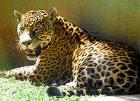












































 Funding for Polish-Venezuelan study of jaguar population
Funding for Polish-Venezuelan study of jaguar populationResearchers at the Mammal Research Institute PAS in Białowieża received PLN 230 thousand state grant for a study the population of jaguars, the largest predators in South America. The study will continue until 2012 and will be conducted in collaboration with scientists from Venezuela. The researchers received the grant for foreign study from the Ministry of Science and Higher Education.
According to the members of the Mammal Research Institute research team, the money will not be sufficient to cover all costs of the project.
The project is implemented since 2009 in cooperation with the Venezuelan Institute for Scientific Research (Instituto Venezolano de Investigaciones Científicas - IVIC), also involved financially in the project. Until now, scientists have completed four expeditions, for example to the Periha mountains near the border with Colombia. Another expedition is planned in November, and its destination is the Orinoco River delta.
Sites selected for expeditions must meet several conditions. "First of all, there must be evidence that there are jaguars; the sites must also represent various environments and be inhabited by various groups of animals" - added Schmidt.
The idea of research was born in during the Polish group leader Prof. Włodzimierz Jędrzejewski’s from Mammal Research Institute PAS stay in Venezuela, at the tropical ecology course for students from both countries. The course was organized by the Jagiellonian University and IVIC in Caracas, the capital of Venezuela.
Scientists from Białowieża are experts, among others, in the ecology of predatory mammals. They study animals such as wolves and lynx that live in the Białowieża Forest. With regard to jaguars they want to determine whether the genetic variation in jaguar populations in South America is associated with what these wild cats hunt. Jaguars live there in various environments and hunt both smaller animals (such as aguti, peccaries, turtles) and large ones (tapirs, cattle).
In Venezuela, jaguar is a protected species, but - according to the researchers - reality is sometimes different. In addition, the process of deforestation and conversion of tropical forests to crops and pastures intensifies. Therefore, there is a need for the program of the protection of South America's largest cats. Polish-Venezuelan studies could significantly contribute into the preparation of such program.